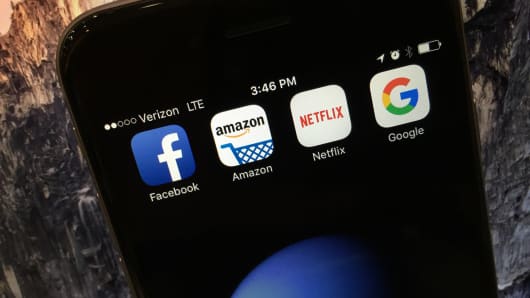Stock market watchers keep complaining about the breadth of the rally — especially in tech.
“The market’s weakness, if it has one, is the concentration of investor monies in one corner of the market: Mega-sized growth stocks, particularly technology,” said MarketWatch a few days ago.
CBS News agreed: “Consider that just 68 percent of S&P 500 stocks are in uptrends right now vs. 80 percent back in March. Nor that tech insiders are aggressively selling their own shares. Nor that just five tech stocks have been responsible for 40 percent of the S&P 500’s market capitalization gains so far this year.”
Those 5 tech stocks are Apple, Alphabet, Microsoft, Amazon, and Facebook.
Here’s the year-to-date performance of each of those five big tech stocks — plus Netflix — as of Friday morning:
- Apple +32.5%
- Alphabet +25.2%
- Microsoft +13.9%
- Amazon +33.8%
- Facebook +32.3%
- Netflix +32.3%
Equal-weighted average of their year-to-date performance: +28.3%.
Meanwhile, the Dow Jones Industrial Average (decidedly non-tech) has a YTD return of +7.1%.
Those who worry about the narrowness of the market breadth usually link this tech strength to a sign of weakness in the broader market. They usually conclude that the disconnect between the success of the tech stocks and the dull returns of the rest of the market must be a mistake on investors’ parts.
Investors must be placing too much hope in these growth stocks, the critics conclude. Some wonder if this hope will all come crashing down soon as it did following the late ’90s dot-com explosion.
Here’s an alternative explanation for this outperformance of these tech stocks this year: Maybe it’s warranted.
There’s a good case to be made that it’s not a bubble of the biggest tech stocks; it’s that the biggest tech stocks have grown to another level in the last few years.
Here is a list of the so-called FAANG (Facebook, Apple, Amazon, Netflix, and Google) tech stocks and how their stocks and operating metrics have changed from 5 years ago to today:
Five years ago, people thought Samsung was about to commoditize Apple, cutting deeply into its margins. Instead, it’s Samsung struggling and Apple that has seen its annual shipments of iPhones soar. They also have a services business they say will do $60 billion a year of revenue by 2020.
Amazon’s web services business grew to $12 billion a year from nothing in the last 5 years. It has a chance to grow that significantly bigger in the next few years. Meanwhile, we keep reading about retail store closings and the “death of retail.”
Five years ago, many skeptics said that Netflix had hit its ceiling with 30 million subscribers because that’s where other services like HBO had tapped out. Today, they have 100 million subscribers.
Facebook has doubled its monthly active users in the last 5 years, allowing it to increase its revenues by 6x to $30 billion last year.
I remember writing a skeptical piece about Google 5 years ago about how they’d get disrupted by mobile search costing a lot more money than desktop search and by people doing product searches on Amazon. Whoops. The number of annual Google searches per year has almost doubled to 3.3 trillion. And even though mobile search is not as profitable as desktop search for them, Google doubled their net income over that period to $21 billion.
Importantly, all these big tech companies are so profitable today that they’re best able to put irons in the fire for new potential products — like driverless cars and artificial intelligence — that could become tomorrow’s next multibillion-dollar businesses.
Start-ups will still be disruptive in the future, but the sheer difference in scale and resources that these larger tech companies can throw at big opportunities today has never been so vast.
The bottom line is that the stock market isn’t perfect, but it’s pretty good at sniffing out real businesses and opportunities. Many howled for years that public market investors were “delusional” awarding Amazon such a high market cap when it constantly lost money. They don’t look so delusional today.
In the same way, big tech’s strong stock performance this year (and the last few years) is not a sign that the stock market is about to collapse. It’s simply a sign of how big and important these companies are becoming right in front of our eyes.
To sign up for Eric’s monthly Tech & Media Email, go here. And to hear his podcasts on these topics, go here.
[“Source-ndtv”] Techosta Where Tech Starts From
Techosta Where Tech Starts From
